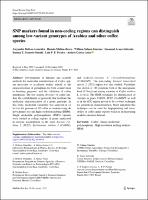SNP markers found in non‑coding regions can distinguish among low‑variant genotypes of Arabica and other coffee species
Abstract
Development of efficient and scalable methods for molecular identification of Coffea spp. are necessary to accelerate studies related to the characterization of germplasm for both conservation or breeding purposes, and the validation of coffee germplasm. The low genetic diversity of coffee hinders the establishment of protocols that facilitate the molecular characterization of a given genotype. In this study, nucleotide variability was analyzed at 22 loci in the genome of 19 coffee accessions using de novo primer sets and high-resolution melting (HRM). Single nucleotide polymorphisms (SNPs) variants were studied in coding regions of genes implicated in sucrose accumulation in the seed, Sucrose synthase 2 (SUS2), Ent-kaurene oxidase 1 (CaKO1), and Caffeoyl-coenzyme A 3-O-methyltransferase (CcOAOMT). The non-coding Internal transcribed spacer 2 (ITS2) region was also studied. Variability was shown at 103 positions both at the interspecies level (15 loci) and among varieties of Coffea arabica L. (4 loci). The HMR technique for identification of variants in genes CaKO1, SUS2, CcoAOMT, as well as in the ITS2 region proved to be a robust technique for germplasm characterization. More important this technique can be used for fingerprinting and traceability of coffee grain exports which is an increasing market-consumer demand
Keywords
Delegation
Sede Central
Publisher
Genetic Resources and Crop Evolution
Is part of
Genetic Resources and Crop Evolution
Status
restrictedAccess
xmlui.dri2xhtml.METS-1.0.item-uri-link
https://doi.org/10.1007/s10722-022-01498-0


